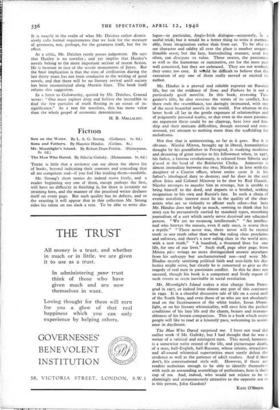Fiction
Mr. Moonlight's Island. By Robert Dean Frisbie. (Heinemann.
The Man Who Dared. By Niko!ai Gubsky. (Heinemann. 8s. 6d.)
THERE is little that a reviewer can say about the above list of books, beyond indicating their contents and conceding that all are competent and—if you feel like reading them—readable.
Mr. Strong's short stories do indeed move freely, and a reader beginning any one of them, except perhaps the first, will have no difficulty in finishing it, for there is certainly no straining here, and the manner of the practised writer declares itself on every page. But such quality has its defects, and to the exacting it will appear that in this collection Mr. Strong rides his talent on too slack a rein. To be able to write dia-
logue—in particular, Anglo-Irish dialogue—accurately, is useful trick; but it would be a better thing to write it memo: - ably, from imagination' rather thait from ear: To be ab:e see character and oddity all over the place is another unques- tionable asset; but the lazy, buttonholing manner, used to often, can dissipate its value. These stories, the passionate as well as the humorous or ruminative, are for the most part well conceived, but they are unbraced. They are not worked; they come too easy. It veguld be difficult to believe that the execution of any one of them really moved or excited it, author.
Mr. Hindus is a proved and reliable reporter on Russian life, but on the evidence of Sons and Fathers he is not a particularly good novelist. In this book, revet sing Tur- geniev's title, he also reverses the terms of its conflict, but there ends the resemblance, too daringly insinuated, with one of the most beautiful novels in the world. For whereas in the latter book till lay in the gentle exposure of relationships and of poignantly personal truths, so that even in the most passion- ate argument there could be no claptrap, here love and kin- ship and their intricate difficulties, though stressed and over- stressed, yet amount to nothing more than the scaffolding for melodrama.
Not that that is uninteresting, so far is it goes. But it is obvious. Nicolai Mitosa, brought up in liberal, humanitarian thought by his grandfather in Petrograd, is studying medicine and dreaming of great service to his fellowmen when, in 1917, his father, a famous revolutionary, is released from Siberia and placed at the head of the Bolshevist Cheka. Animosity i, almost immediate between the two; Nicolai is in love with the daughter of a Czarist officer, whose entire caste it is his father's ideological duty to destroy; and he does in the end allow Irina and Colonel Mirovoy to be shot by Red Guard, Nicolai attempts to murder him in revenge, but is unable to bring himself to the deed, and departs to a brothel, seeking resignation to his own and Russia's fate. In such a chain of events novelistic interest must lie in the quality of the char- acters who are so violently to affront each other—but here Mr. Hindus does not help us much, seeming to think that his story can be persuasively carried by standard types, mouthing journalism of a sort which surely never deceived any educated person. "We are no moaning intellectuals." "An intellec- tual who betrays the masses, even if only once, is worse than a reptile." "There never was, there never will be eternal truth or any truth other than what the ruling class proclaims and enforces, and there's a new ruling class in the world now, with a new truth." "A hundred, a thousand lives for one life, for one of our lives." Such stuff, page after page, from Mitosa Ore wrings no more distinguished answer anywhere from his unhappy but uncharacterised son—and were Mr. Hindus merely satirising political faith and non-faith his dia- lectics might serve, but clearly he is concerned to give us the tragedy of real men in passionate conflict. In this he does not succeed, though his book is a competent and lively report of such events as seem inevitable in social revolution.
Mr. Moonlight's Island makes a nice change from Petro- grad in 1917, or indeed from almost any part of this continent in 1940. It is a cheerful discursive tale of life on a coral atoll of the South Seas, and even those of us who are not absolutely mad on the facetiousness of the white trader, Javan Moon- light, or on his literary whimsicality, will envy him the perfect conditions of his lazy life and the charm, beauty and manage- ableness of his brown companions. This is a book which many people will like to read at a leisurely pace, welcoming its assist- ance in daydream.
The Man Who Dared surprised me. I have not read the earlier work of Mr. Gul;isky, but I had thought that he was a writer of a satirical and astringent turn. This novel, however, is a somewhat naive record of the life, and picturesque death, of a man, half-English, half-Russian, whose talents, attraction, and all-round whimsical superiorities must surely defeat the credence as well as the patience of adult readers. And if they don't, his conversational style will. However, if there are readers audacious enough to be able to identify themselvc• with such an astounding assemblage of perfections, here is their cup of tea. And, indeed, who would not rejoice to be az, alarmingly and instantaneously attractive to the opposite sex
is this person, John Gordon?
KATE O'BRIEN.


































 Previous page
Previous page